www.chechurubiera.info - an online magazine for fans of Chechu Rubiera
INTERVIEWS 2006
Chechu talks about the Giro, his thoughts about that exciting second place finish on Stage 3 and his hopes for the Tour de France.
... ON THE GIRO D'ITALIA
Chechu, there was a great excitement among your fans after your second place finish on Stage 3. Can you tell us how it was for you, how did it happen? Did you target this stage for a possible win before the Giro started? And how did you feel afterwards?
The Giro stage where I came second was both a satisfaction and a
disappointment at the same time for me. On the one hand, I had a glimpse
of victory, so I was very disappointed to lose just at the last gasp. On
the other hand, I was very pleased to find out that I was in great shape
right from the start of the Giro and with the whole race ahead of me.
Furthermore, the winner of the stage was much stronger than me and bad luck
or tactics did not have any influence on the outcome of the stage.
So, I can only congratulate the winner and carry on trying my best.
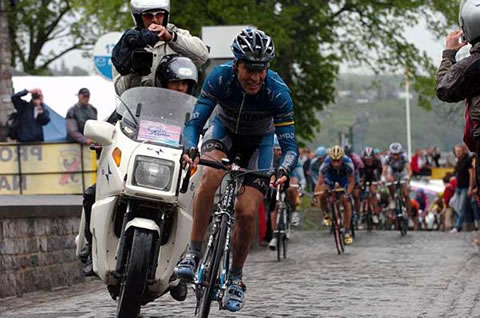
On this stage, the weather made the race even more difficult. It rained the
whole day and the final part was made more difficult because the arrival was
uphill.
When I noticed, on reaching the final two kilometers, that Paolo Bettini,
the favourite, was isolated from his team, I thought it was the right moment
to attack. I had not planned an attack but I felt good and it seemed the
right time.
Youíve said that youíll get more freedom this season. In your first Grand Tour without Lance, you had some great results. Were you happy with the opportunities you were given?
The team misses having an outstanding leader and buddy like Lance but it
makes us more competitive and aggressive, and we have more opportunities to
take initiatives.
We cannot afford to ignore opportunities just to save our strength for the
Tour. It's the others who will have to control the race and carry the
burden.
It's a type of riding which is very different from previous years but,
nevertheless, I enjoy it.
What was your physical condition after the Giro? How do you recover and prepare for the Tour?
I finished the Giro in much better shape than I expected and after a week of
light training, I am gradually increasing my work load.
... ON THE TOUR DE FRANCE
The Tour de France is just three weeks away, can you tell us about your average day now, next week and in the week before the Tour starts. When do you join the team in France?
I am not going to ride any more races until the Tour.
I think that we will all get together on Tuesday 27 (June) to prepare for the
start of the Tour.
You always finish high in the GC, what is your hope for this yearís Tour de France? Will there be opportunities for you to win a stage?
I generally come out well in the overall standings of the important stage
races.
I am not a winner but my consistency helps me to be in a good position at the
end of stage races lasting several weeks.
I hope to be able to stay with the best. I think we have a rider who has
many talents and who at the same time will not bear the pressure of being a
favourite. It's Popovych.
The other riders, I think, will have more freedom although we will, as
always, ride as a team.
I would love much to win a stage; I would really love it, but it's always very
difficult and especially on the Tour.
ESSENTIAL INFO
Youíll have a special diet during the season, what kind of foods do you normally eat during the season, what do you miss eating? And most importantly, does your wife share in your restricted diet?
During races, carbohydrates (pasta, rice, potatoes...) are essential.
During training at home, I eat carbohydrates only on the days of really hard
training.
The rest of the time, a lot of fruit, vegetables, and grilled meat, fish or
chicken.
My wife Laura follows the same diet, so that I don't become tempted by other
food which would not be good for me.
In Asturias there is a traditional dish that I love but which contains a
lot of fat. It's called "fabada" and is made with beans, chorizo, blood
sausage, and knuckle of ham.
What wouldn't I give for a "fabada".....
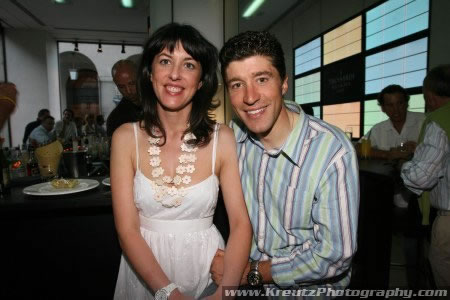 After the Giro. Chechu and his wife, Laura.
After the Giro. Chechu and his wife, Laura.
After this year's Tour de France, we asked Chechu about growing up in Spain, his inspirations, current issues in cycling and some old fan favourites.
Are you Asturian first, then Spanish? Why is your local language important, do you speak Asturian at home?
I am equally proud to be Spanish and Asturian. I speak Asturian which is a dialect of Spanish, and very similar, although unfortunately itís becoming obsolete and only a few words are still used between Asturians. A lot of others are now out of use. Itís a shame.
You were born into a different regime and grew up at a time of great change for Spain. Were you aware of this cultural and political change, what are you recollections about growing up at this time?
I remember nothing. I was 2 years old when Franco died. Since I was very young I was not really preoccupied by the period of transition.
I only remember quite clearly the coup díetat of 1981, because I was aware of my parentís preoccupation confronted with the uncertainty of the future.
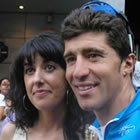 Where do you go to find peace and inspiration? Maybe place or a person?
Where do you go to find peace and inspiration? Maybe place or a person?
In my house in Asturias, I certainly find a peacefulness which helps me a lot in my training and resting. Most of all, I am very happy here at home. But without Laura, it would not be the same ...
We know your sister Carolina, who helped us to first contact you. Can you tell us about the rest of your family?
I have two older sisters, Carolina and Ana Isabel. Caro is a teacher and Ana is a journalist.
After the Giro, you raised concerns about its organisation, especially scheduling. There were similar complaints about the Tour from cyclists. Do you think stages should be shorter, or more rest days perhaps?
In the multi-stage tours, I would make more rest days; at least one every 5 days. I would also make tours of two weeks; 3 weeks is too much.
Some mountain stages have four or five big climbs, and there can be three or four difficult stages in a row. Is this necessary to the spectacle of road racing? And if they are too physically demanding, how would you schedule the mountain stages?
Itís logical that there should be high mountain stages. Itís part of this sport. But one could have the same excitement watching a stage with 170km and 4 climbs, instead of 220km and 7 climbs, for example.
And with protests a couple of weeks ago at the Deutschland Tour, are cyclists now demanding a greater role in the organisation of cycling and races?
Yes, they ask that common sense be used when organizing the races, especially with regard to security and difficulty. Fortunately, efforts are being made but there is still much to do.
During the Tour, you were losing a lot of time in week two, often finishing at the back. You had an infection, why didnít you just go home and recover? What motivates you to keep going?
My team mates, the team and my self esteem. I only abandoned once in a grand tour, in the 1999 Giro because of an attack of gastroenteritis that knocked me out.
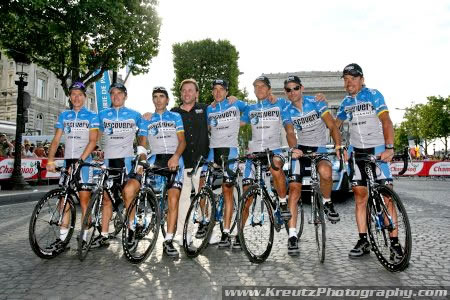 It was a different Tour this year for you and your team? How do you feel about it now, after a few weeks of reflection and recovery?
It was a different Tour this year for you and your team? How do you feel about it now, after a few weeks of reflection and recovery?
It has not been a bad Tour for the team, with one stage victory and the yellow jersey. Many teams would have been content with that. But for us, who were used to winning with Lance, it did not seem much. And I, personally, was well below my normal level.
Doping in sport is presented as a legal and moral issue, rarely as a medical one? Are the medical implications of doping overlooked by the authorities, are cyclists educated enough about the possible long term effect of taking drugs?
I think that doping in road racing is not generalised, that itís the sport that fights most against doping. The health controls we go through regularly voluntarily every 3 months help to avoid this type of problem.
Fortunately, most doctors who practise in cycling are concerned above all about our health, and follow our condition very closely. I also think that nowadays we have access to all kinds of information and no rider would want to sacrifice his future or his health for glory or money.
At the end of last year, you said that the image of cycling was very poor. Things have got a lot worse since. As a clean cyclist, how do you respond to your profession, which is such an important part of your life, being vilified in the world media?
If we have this image of cycling, itís without any doubt everybodyís fault, the riders, the directors, the UCI, but there is a great deal of hypocrisy in focusing the entire problem of doping on road racing without seeing that most sports are not subject to all the tests we have to go through, neither in quantity nor in quality.
What can the cyclists themselves do, apart from ride clean, to improve the image of cycling now?
Not much more than pass on an image of hard work, sacrifice and a clean sport.
There are changes in Discovery Channel next year, with new signings Leipheimer, Paulinho and Vaitkas. Do you know yet how that might affect your schedule for the 2007 season? Is your contract signed yet?
Yes, I have already signed my contract but I donít know the programme for the coming year. I imagine it will depend on the staff we will have.
Cycling is tough sport, you have to make many sacrifices. What advice would you give a young Spaniard who wants to follow in your footsteps?
Itís very difficult, even for the young ones, but I encourage them to continue with confidence to train and progress within their limits. Itís a great satisfaction to always have higher, but realistic targets, and then to excel oneself as the workload and the pleasure increases.
Stage 10 of the Vuelta travels through Asturias, on roads you will know well. Will you be there, and what are the highlights of this stage?
Yes, I want to go to La Cobertoria. Itís a very difficult stage, most of all San Lorenzo. Itís the most important stage of the Vuelta.
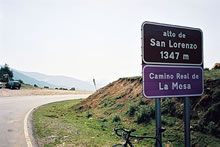
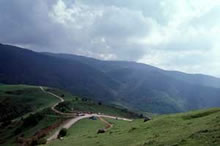
In just one word :
Relaxing at home - music or TV? Music
The best place in the world Asturias
The best movie ever Life is Beautiful
The book on your bedside table tonight Cosmos by Carl Sagan
A night out Ė movie, dinner or nightclub? Dinner
Best sport after cycling Athletics
The person you most admire Indurain is one of them. He seems to me a great man.
Your next race Grand Prix Ouest France Ė Plouay (Sunday 27 August)
And without asking her, whatís Lauraís favourite colour? Pink
Many cyclists ally themselves to charitable causes, is there a local charity which you support? If so, can you tell us more about it?
Unicef and Ayuda en Accion (Help in Action). I am a member of both.
On our Music for Chechu CDs, tracks were selected for you by fans, was there anything you particularly liked, anything new to you?
I specially like Start Me Up by the Rolling Stones but there are several tracks I did not know before and like.